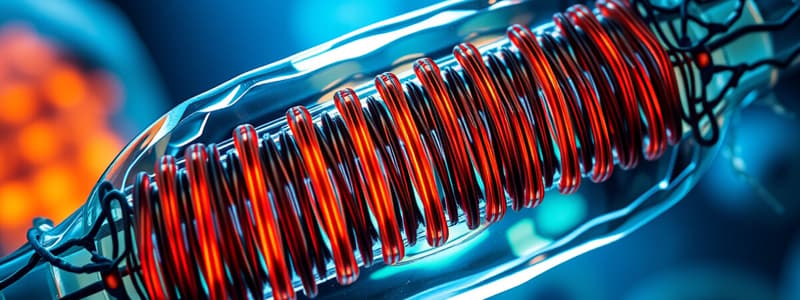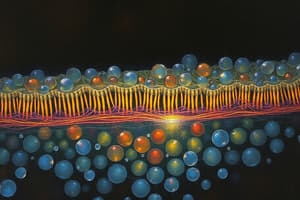Podcast
Questions and Answers
What is the primary function of the cell membrane?
What is the primary function of the cell membrane?
- To store genetic information
- To control the movement of substances in and out of the cell (correct)
- To provide energy to the cell
- To assist in protein synthesis
Which organelle is responsible for producing ATP?
Which organelle is responsible for producing ATP?
- Endoplasmic reticulum
- Mitochondrion (correct)
- Nucleus
- Ribosome
Which process is primarily involved in the transmission of genetic information?
Which process is primarily involved in the transmission of genetic information?
- Transcription (correct)
- Photosynthesis
- Respiration
- Fermentation
What is the basic unit of life in all living organisms?
What is the basic unit of life in all living organisms?
What type of bond is formed between amino acids in a protein?
What type of bond is formed between amino acids in a protein?
Flashcards are hidden until you start studying
Study Notes
Cell Membrane Functions
- Acts as a protective barrier, regulating the entry and exit of substances in and out of the cell.
- Maintains homeostasis by controlling the internal environment and responding to changes in the external environment.
- Contains proteins that facilitate communication, signaling, and transport across the membrane.
ATP Production
- Mitochondria are the organelles responsible for the production of ATP (adenosine triphosphate).
- ATP is generated through cellular respiration, which includes glycolysis, the Krebs cycle, and oxidative phosphorylation.
- Mitochondria are often referred to as the "powerhouses" of the cell due to their role in energy metabolism.
Genetic Information Transmission
- The process of DNA replication, transcription, and translation is essential for the transmission of genetic information.
- DNA serves as the template for RNA synthesis, which then guides protein synthesis.
- These processes ensure that genetic information is accurately passed on during cell division and throughout an organism’s development.
Basic Unit of Life
- The cell is the basic unit of life in all living organisms.
- Cells can exist as single-celled organisms (like bacteria) or as part of multicellular organisms (like plants and animals).
- All cellular functions are carried out within cells, from metabolism to growth and reproduction.
Amino Acid Bonds
- Peptide bonds are formed between amino acids in a protein.
- These covalent bonds link the carboxyl group of one amino acid to the amino group of another, releasing water in the process (condensation reaction).
- The sequence and structure of amino acids determine the protein's function and properties.
Studying That Suits You
Use AI to generate personalized quizzes and flashcards to suit your learning preferences.




